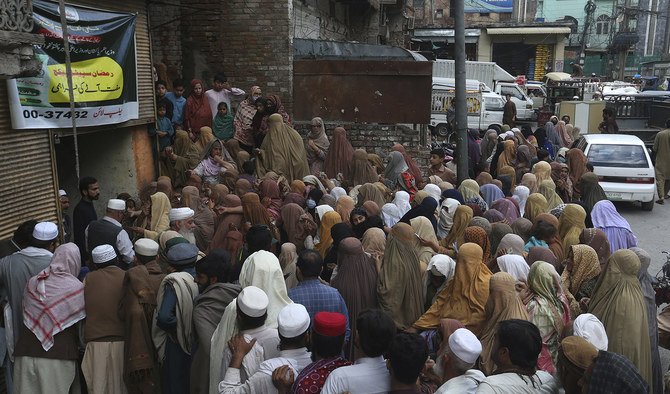PESHAWAR: One person was killed and eight others injured during a stampede for free flour in inflation-wracked Pakistan on Thursday, the first day of the holy month of Ramadan.
The price of basic food items has rocketed in recent months, with inflation at a near 50 year-high as the country grapples with a balance of payments crisis that has seen it forced back into negotiations with the International Monetary Fund.
“Nine people were trampled and were taken to hospital where one person died,” said Muhammad Arif, police chief for Charsadda in northwestern Khyber Pakhtunkhwa province where the incident happened.
Arif said hundreds of people gathered at the local market for the handouts, one of hundreds of distribution points set up by the government during Ramadan.
Millions of low income families across the country are registered under the scheme.
In a nearby district, a man died and four others were injured when a wall they were sitting on collapsed as crowds amassed for free flour.
Authorities told AFP it was not clear why the wall collapsed.
Pakistan’s finances have been wrecked by years of financial mismanagement and political instability — a situation exacerbated by a global energy crisis and devastating floods that left a third of the country under water last year.
The South Asian nation is deeply in debt, and needs to introduce tough tax and utility price increases to unlock another tranche of a $6.5 billion IMF bail-out and avoid defaulting.
One person dies in stampede for free flour as Ramadan begins in Pakistan
https://arab.news/9xgvc
One person dies in stampede for free flour as Ramadan begins in Pakistan

- Eight others were injured during free flour distribution in northwestern Pakistan's Charsadda city
- Decades-high inflation in Pakistan has pushed prices of basic food items out of many people's reach
Pakistan bank enables Shariah-compliant digital payment facility for passengers at Islamabad airport
Pakistan bank enables Shariah-compliant digital payment facility for passengers at Islamabad airport

- Pakistan is a cash-dominated market where a significant portion of transactions in the informal sector are made without any taxes, officials say
- The move comes amid Pakistan’s efforts to introduce a cashless model at airports under which only digital service providers can provide services
KARACHI: Aik, Pakistan’s first Islamic digital bank, has enabled fully digital payments at Islamabad International Airport to offer travelers and passengers secure, Shariah compliant digital transaction facility.
The development comes amid Pakistan’s efforts to introduce a cashless model at airports across the country, under which only digital service providers can provide services to customers.
Aik, a subsidiary of Bank Islami, said it has onboarded merchants across the Islamabad airport and integrated QR code deployments at key touchpoints to allow passengers and visitors to make secure, seamless, and Shariah-compliant digital transactions at all counters, retail outlets, and service points.
It said the implementation complies with the regulations and framework set by the State Bank of Pakistan (SBP) and is a working model for a large-scale adoption of cashless systems in public infrastructure.
“This deployment reflects our commitment to building practical digital infrastructure that improves everyday transactions,” Aik Chief Officer Ashfaque Ahmed said in a statement.
“By enabling a fully cashless environment at a major national gateway, we are supporting efficiency, transparency, and financial inclusion at scale. This is not only a project; it is a foundation for Pakistan’s cashless future.”
Pakistan is a cash-dominated market where a significant portion of transactions, particularly in the informal sector, are conducted in cash. Officials say many of these transactions are aimed at avoiding taxes.
In recent years, the SBP has taken steps to ensure a transition toward a more cashless economy so that transactions are more traceable, reducing chances of tax evasion and corruption.
By digitizing Islamabad airport, aik said it continues to invest in secure and accessible financial solutions that “expand digital participation and support national economic modernization.”










